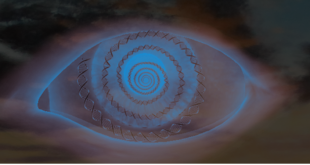This dialogue with the writer and director of Ex Machina Alex Garland is meant for people who have already seen the film (plot spoilers abound). The conversation ranges from looking at the film as a Turing Test directed at the human species to a discussion of psychopathy, evolution, and the illusory nature of perception.
Alex Garland is a British novelist, screenwriter and film producer who wrote The Beach, and screenplays for Sunshine, 28 Days Later, Take Me With You and Dredd amongst many other creative works.
Jonathan Zap has been writing about the “Singularity Archetype” since 1978. His book, Crossing the Event Horizon—Human Metamorphosis and the Singularity Archetype discusses theories relevant to Ex Machina.
Jonathan: Thank you for making this possible Alex. As we discussed, this will be a little bit unconventional because I’m sure you’re tired of answering all the conventional questions anyway, so I’m going to throw an unconventional theory/proposition about the film at you and see how you react to it.
Alex: OK, I’ll do my best.
Jonathan: This may seem a bit challenging, but one thing I am not challenging is the brilliance of this film, which is not only one of the best science fiction films I’ve ever seen, but one of the best and most important films I’ve seen period.
Alex: That’s very kind, thanks.
Jonathan: We talked briefly at one of the early showings and you stated that the interpretation of any movie or any narrative is fifty percent the creator and fifty percent what happens with the recipient. I’m going to stretch the mathematical metaphor and suggest that there could be a third fifty-percent that overlaps and influences both of those two parties—
Alex: OK, that’s a Venn diagram
Jonathan: Right, and that would be the archetypal domain. And specifically—
Alex: When you say “archetypal” I need to know exactly what you are talking about. You’re talking about the domain that relates to archetypes? So things like commonly accepted in terms of, like, if you’re been impolite you would say a cliché and if you’re being polite you say archetype.
Jonathan: No, I mean “archetype” in the Jungian sense like the hero, the devouring mother—
Alex: Oh, OK, archetypes.
Jonathan: These archetypes are living agencies, they shape us as well as being patterns that we can observe.
Alex: And these are the sort of repeating myth type stuff?
Jonathan: Right, and then there is an archetype that I believe I discovered in 1978 that I call “the Singularity Archetype.” I believe that Ex Machina is largely a manifestation of that archetype which relates to evolutionary metamorphosis.
I think most people assume that the film has three dominant characters—Nathan, Caleb and Eva, but I’d like to suggest that there’s a fourth and more dominant character which best represents the archetypal domain and the unconscious—and that is the house—the house as evolutionary crucible of the Singularity Archetype. The house functions operationally as the unconscious in that it is a paradoxical hall of mirrors that employs three specific things: figure-ground reversal, misdirection—which is a conscious part of the film, and cognitive dissonance. Basically, the house creates a total reversal so that what begins as a Turing test aimed at Eva, the AI, turns into a Turing test, a consciousness-versus-mechanical test, of Homo sapiens which is personified by Caleb Smith. With a name like “Smith,” the most common last name, it suggests that he is an everyman standing in for the whole species.
Alex: And for the audience.
Jonathan: Right, exactly.
Alex: Because Caleb is a surrogate for the audience in many key respects at certain times.
Jonathan: And there are many brilliant ways in which that becomes more powerful during the film, which I’ll get into. But the house begins as a brilliant and powerful image system as the outer manifestation of Nathan’s character. And Nathan in turn—just like in U.S. law, corporations are considered people—Nathan is a corporate person, he represents these seemingly friendly, seemingly unassuming, regular guy, cool (corporate) personalities, but underneath—just like underneath the house that looks so eco and friendly and unassuming at first—but as soon as he gets to the front door which is like a bank vault door and has this intrusive scan—we begin to understand that the house is actually not this eco/friendly place, but is a fiber-optically intense, military-industrial complex, that’s going to invade privacy.
Alex: Right. So just to say the only thing I would like to add to that is just not to stop it at the boundaries of the house, because the house exists in a landscape. What you have is this character/house—which I would agree with that—the house does have a character, and has a very particular role to play which is like a character, and it even talks at times, but it is contextualized within a landscape, and so some aspects of its character are thrown into relief by the landscape. You have a huge external world, an uncontrolled environment—sky, glaciers, rivers, mountains, forests—and then what that does is draw attention to the degree to which this house is micro-managed and over-controlled and then also starts to disintegrate.
Jonathan: Right and especially with the huge waterfall which is such a dynamic landscape element—
Alex: Yeah, an unstoppable power.
Jonathan: Right, unstoppable force, and this is one of the themes— what looks like what is set up, the house, under the control of the ego, the corporate person—
Alex: Yeah
Jonathan:—turns out not to be, to be its own entity and to be the one that actually breaks down the ego. So the house has this persona of eco/friendly one side, military-industrial-aggressive other side—
Alex: A prison.
Jonathan: And what’s also interesting is that we see persona masks on an illuminated wall inside the house.
Alex: Yeah, yeah.
Jonathan: So that’s pretty fascinating. And Nathan seems to be the ruling ego in control of the house, but what the Singularity Archetype does, among other things, is it breaks down ego structures and patriarchy to create metamorphosis. And so Nathan—and I know you found Apocalypse Now to be a source of inspiration (for Ex Machina)—so Nathan, like Kurtz in Apocalypse Now is an ego in a breakdown phase.
Alex: Right, agreed.
Jonathan: And just like the jungle, which is clearly the unconscious in Apocalypse Now, is melting down Kurtz, the house is already melting down Nathan, which further suggests that it is also like the unconscious. And then there are this series of misdirections, cognitive dissonances, with human and mechanical forms changing and becoming more human, and figure-ground reversals until the Turing tester, the everyman, Caleb Smith, has to test himself to see if he is human and he switches places with Eva and he is the one who remains trapped in the house as the rat who cannot solve the maze. And so, Caleb, the everyman, arguably fails the Turing test because of a specific reason—he can’t get his sexuality to be more conscious than mechanical. Basically the search engine has used his porno searches to generate the perfect face to arouse his anima projection, his romantic projection—
Alex: I just want to take issue with the use of the word “Turing test” because Turing test—it’s a sort of post Turing test—it’s me being pedantic about it. There’s a little discussion about this in the movie—the actual terms of the Turing test is not really a test for sentience it’s a test for language in some respects, which may or may not really imply sentience. But anyway, keep going.
Jonathan: Yeah, and obviously human beings are supposed to be the definition of the successful passing of the Turing test, but yet with the deeper meaning (of the post Turing Test) it is not so clear how much we pass it because there are places in which our sentience is compromised by mechanicalness. And so—
Alex: Yeah, and also I think we probably just perceive— our conception of what the consciousness we have is— may well be wrong. We may just misperceive what we are, in as much that mainly what we are is consciousness.
Jonathan: Right and that’s part of the theme of the Singularity Archetype is that as we pursue AI, it calls into question and transforms our sense of our own consciousness as we try to act like gods and create (consciousness) out of a physical substrate.
Andrew: I’m sure that’s true, but it might be because we misapprehend what consciousness is. I mean it may not be as well, the truth is that with a lot of this stuff there are no concrete answers to the questions you can provide because at this exact moment in time we don’t know. We don’t know how consciousness works, and we don’t know what sentience is in some respects, in some very important respects.
Jonathan: Nathan points out that we have a type (a type we are attracted to), and we have a sexual orientation and it’s a dominant theme that controls so many aspects of our lives and yet we don’t choose it. And as Gurdjieff once said, if there were a second obstacle on the path of enlightenment as great as sexuality that he would never have been able to achieve a state of enlightenment.
Andrew: Who, sorry?
Jonathan: Gurdjieff, the great mystic who brought so many insights of the East to the West and created a system of how to become unmechanical—
Andrew: When?
Jonathan: He was most active in the early 20th Century and up to the thirties and forties.
Andrew: Oh right, OK.
Jonathan: So, the AI Turing test turns out to, be from my point of view, a vast misdirection that turns back on human consciousness at the precipice of metamorphosis and shows Eva breaking free of the house and succeeding in her next evolutionary step while Homo sapiens remain trapped by mechanicalness.
Andrew: Cool
Jonathan: And one of the scary aspects of human evolution that’s also picked up is psychopathy, the condition of being a psychopath.
Andrew: Right.
Jonathan: And so the professional group that tests out as the highest in psychopathy are CEOs, Nathan’s exact job basically—
Andrew: Right, yeah.
Jonathan: So we see empathy versus psychopathy. Because a big theme going on, and in relates to the financial meltdown, is psychopaths ruling the world.
(See Jonathan’s Reality Sandwich article: Foxes and Reptiles—Psychopathy and the Financial Meltdown or listen to the Podcast or YouTube versions)
So how much are we empathic and how much are we living in the corporate culture of what I call “situational psychopathy?”
Alex: Right.
Jonathan: As much as AI is a central theme, even more powerfully in some ways (Ex Machina) is turning this advanced Turing test on us and showing us as beings more mechanical than we think we are and as less empathic than we think we are.
Andrew: I think it is true probably that we misperceive ourselves in all sorts of different ways. One thing about empathy is that people often treat it as if it’s a blanket thing and a binary thing—you’ve either got it or you haven’t and if you do have it you apply it sort of generally to everything. In fact, although there may be people who do not have empathy at all, the people who do have it are selective about it—the empathize with some people but now with others—and a lot of it is related to proximity and what people choose to look at. So somebody who sees themselves as being good in many respects may, for example, regularly take cocaine and are choosing not to think about the means in which that cocaine arrived in their wallet, maybe not thinking about some of the people that are getting killed in Mexico to get the cocaine to their wallet, or Columbia or wherever it is, and so we can choose to look or not look.
Jonathan: Like so many of the morally ambiguous characters in The Beach.
Alex: Right. What I would say just to sort of slightly modify a bit the Turing test thing that you said is that in the character of Nathan I wouldn’t necessarily say that he is a psychopath. I’ve read those same articles that say CEOs have a higher incidence of that particular thing than in the general public and that may or may not be true, I’ll take it as sure, why not, it kind of makes sense doesn’t it? In the case of Nathan, there is a game he is playing which is that to an extent presenting himself as something from which this robot needs to be rescued, and so it is within his interests to appear that way to this young guy, and because the young guy is a surrogate for the audience, to us as well. And so, in my mind at least, there is an ambiguity there. But that doesn’t necessarily effect the broader terms of what you are saying.
Jonathan: Yeah, and psychopathy is on a spectrum, a continuum as you have pointed out. And also what is really fascinating is his last line that most people in the audience reacted to as funny, which it is, but it also has a lot of deeper meaning, “This is unreal.” So if you think of him as an ego, this is the most real thing that’s ever happened to him, but what’s unreal for the ego is death and total loss of control which is what he experiences in that moment.
Andrew: Yeah, and that side of the whole thing is unreal.
Jonathan: Right, it is surreal for sure.
Andrew: Yeah, you can have that thought in many times and many places and many contexts.
Jonathan: And what I thought was especially brilliant also was how you perform that Turing test on the audience, on the viewer, especially a heterosexual male viewer, because of the cognitive dissonance created where you start out with Eva with the human face—because if she had a wire mesh face we wouldn’t identify with her as a romantic projection—
Andrew: Or maybe not as quickly, because one of the things that people do is they do project sentience quite quickly into things. In a way, in the end, I think that’s often what empathy is—understanding that something else is sentient. And in some ways I think it is true humans misunderstand their own sentience. I think that’s highly likely. But they also misunderstand the sentience of other things inasmuch as sometimes they project it into things that don’t have it. We do that a lot reflexively. I mean objects—it might be a cuddly toy, or a pen or a computer or a tree that we feel has a degree of sentience that it doesn’t have. Actually that unreal thing that Nathan says in some respect relates to that—that our sense of what is actually going on is really quite fluid.
I saw a really interesting experiment that a professor of neuroscience presented in a lecture I was attending a few months ago where it shows this in quite a literal way. I hope I do the right job in describing it. Basically what it does is it takes an image, a white screen the size of a cinema screen in the context of a lecture, a black cross in the middle and around it, at the points roughly where the hands of a clock would be, one-two-three-four are these mauve dots and one of these mauve dots is missing and then what happens is that he starts to animate the process and the missing dot starts to move around so that it starts in the twelve o’clock position, then in the one and the two and the three so it’s a rotating missing dot among mauve dots on a white background, and then he says, “look at the black cross,” and after about three seconds, even though you know this is going to happen and even though he’s informed you that this is going to happen, all the dots disappear, all the mauve dots vanish, and where the missing dot was, a perfect green circle appears moving in a circle going around. So the light waves that are hitting your optic nerve are being completely reinterpreted in a wholly different way, you are seeing something without the benefit of LSD or anything like it and seeing something that is literally not there and what it does is it demonstrates to you that what your brain actually does is not tell you what’s in front of you, but gives its best guess on the basis of what it has in front of you. And once you know that, once you know you can’t literally trust what you see, where does that take your consciousness? The world becomes so intensely subjective and so personal the unreal thing starts to become actually the dominant state, not just the moment when you get stabbed, but the whole thing.
Jonathan: It takes you to the hall of mirrors of the house—
Andrew: Yeah
Jonathan: —where all our senses report is a past tense recapitulation, a simulacrum (created by neurological processing) based on information—
Andrew: A guess—
Jonathan: Right, exactly, and the cognitive dissonance becomes manipulated during the course of the movie because as Eva becomes fully fleshed now the projection, the romantic projection that a viewer might have onto her becomes fulfilled at the end and empowered so the whole idea of the mechanicalness versus the humanness becomes this incredibly blurred line.
Andrew: Yeah, blurred, agreed.
Jonathan: Alright, well, thank you so much for your time.
Andrew: Pleasure man, thanks a lot.
Special thanks to Andrew Anderson for help with videography and logistics and to Tanner Derry for video postproduction.
 ZapOracle.com home to the free 720-card Zap Oracle
ZapOracle.com home to the free 720-card Zap Oracle






